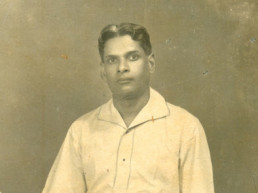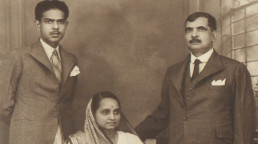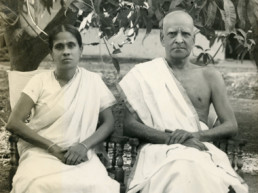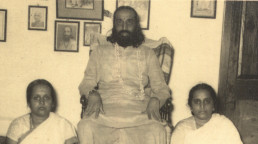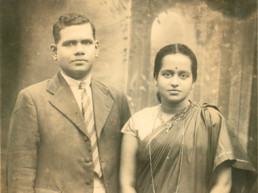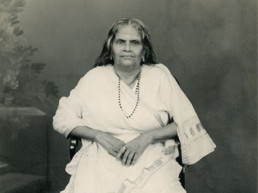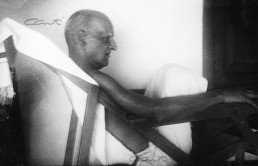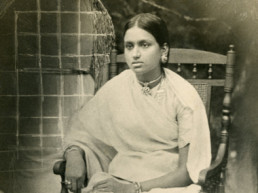Bhaskara Menon
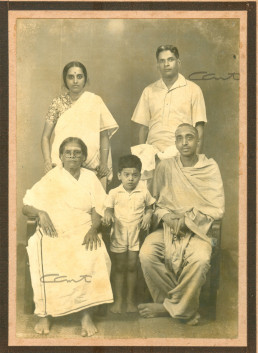
Bhaskara Menon
Bhaskara Menon was the third child of Kochu Amma and elder to Balakrishnan by ten years or so. They grew up together and Bhaskarettan, as the elder brother, would chastise the young Balan who was very mischievous.
When Balakrishnan became Swami Chinmayananda, the family found it very difficult to accept it. How could the bright young fellow, full of pranks and so fond of a good life, who enjoyed wearing fashionable clothes and playing tennis become a sannyasi in ochre? Kochu Amma was, of course, very happy. And at the first sight of Swami Chinmayananda, the elder brother Bhaskaran fell at his feet and prostrated full length. Now their relationship gathered a new glow.
When Swami Chinmayananda started getting his Upanishad commentaries published, he had no place to store the books. Bhaskara Menon made his own house and wooden cupboards available as a godown. He also extended the much needed financial help. Though they had six daughters and two sons, his wife Vilasini did not hesitate to pledge her jewellery to send money for the book publications.
Bhaskara Menon’s family has donated more than 450 letters of Gurudev to the Chinmaya Archives. The first of these was a letter to his mother, written by Gurudev as a student on February 26, 1941 from Butler Hostel.
Narendra Shroff
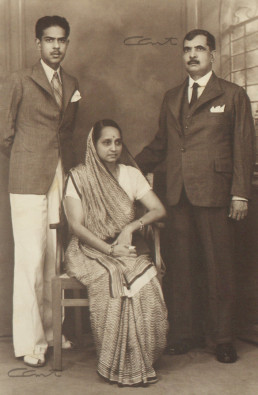
Narendra Shroff
Narendra Shroff, a bosom friend of Balakrishnan, was studying in Lucknow University. Kuttan Menon knew Narendra’s father and it was through this contact that he learnt about the Lucknow University and decided to send Balakrishnan there.
The two young men shared a passion for tennis and became inseparable friends. After college, Narendra returned to Delhi and got married. Around this time Balakrishnan got involved with the freedom movement. After this break, they met each other in Delhi and continued their friendship. By this time, in date 1944, a son was born to Narendra. Within a year, Narendra came down with a paralytic stroke. Balan treated him like his own brother and often stayed with him to massage him and help him with his physical needs. Slowly his condition deteriorated and he passed away in 1947. This was a great shock to Balan and the world came crumbling down around his shoulders.
Balan had already visited Sivananda Ashram in Rishikesh as a journalist in 1946. Gradually, his visits became more frequent and he stayed in the ashram from July to October 1946. Shroff’s death became a catalyst. The balance tilted and Balan moved over to the ashram and the spiritual way of life for good.
Devaki
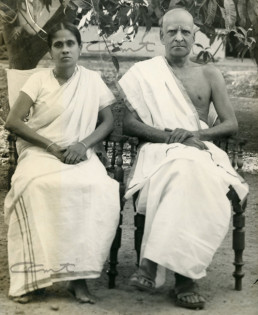
Devaki
Devaki, the second wife of Kuttan Menon, was highly educated and a post-graduate in Sanskrit. She was intensely spiritual and used to entertain swamis of the Ramakrishna Order frequently. Strict fasting, japa and other such sadhanas characterised her daily routine. Naturally, she had a lot of respect for Swami Chinmayananda. So did her children, who looked up to the resplendent young swami, who continued to offer his affection and support for all of them.
There is an interesting episode narrated by Vijaya, one of Devaki’s daughters. She explains how Gurudev helped the family at a time when all of them were ill.
Devaki’s brother, Puthezhath Rama Menon, was the Sarvadhikari of Cochin State, and later a High Court judge. He was a well-known writer in Malayalam and became a Fellow of Kerala Sahitya Academy. He was the president of Chinmaya Mission Thrissur for a few years and arranged Gurudev’s first jnana yajna in Thrissur.
Kanakam
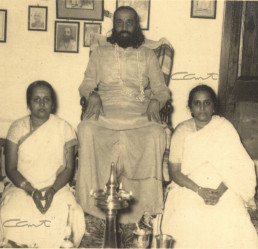
Kanakam
The youngest of Parukutty Amma’s children was Kanakam. She was born in December 1921. Since her mother passed away after giving birth, she was brought up by Janaki Amma, another sister of Parukutty Amma.
Kanakam was very emotional by nature and had a life-long guilt that her mother died because of her coming into the world. She was extremely attached to Balan. Her early schooling was done in Ernakulam. The young Balan would often bring her back from school on his bicycle.
Kanakam was married into the royal family of Cochin. Through the years, she maintained a close contact with Gurudev, writing innumerable letters to him, talking to him over the phone and periodically attending his jnana yajnas. Listen to the reminiscences of Sri Raveendran, Kanakam Amma’s eldest son.
Padmini
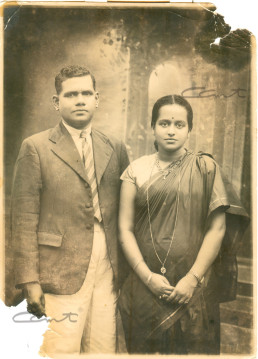
Padmini
Padmini, Balakrishnan’s younger sister, was born on October 13, 1919. She grew up in Poothampalli House, along with Balooppa, as she called him. Her pet name at home was Thankam.
Padmini had some problem with her eyesight from childhood. Balakrishnan was very protective and helped her in every way possible. Listen directly to her daughter Jaya Menon.
Padmini married Madhava Menon, who gave his full support to Balakrishnan so that he could go to Lucknow and pursue higher studies and become a barrister as Kuttan Menon, the father, envisioned.
As Padmini’s eyesight deteriorated in the later years and she could not read, Gurudev sent her recordings of his talks at the jnana yajnas.
A before and after look at Swami Chinmayananda, younger sister Padmini (left) and the youngest sister Kanakam (right)
Drag the divider to the right, then to the left.
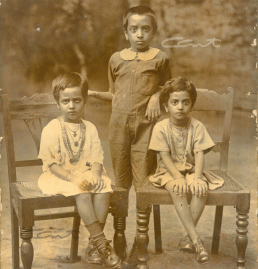
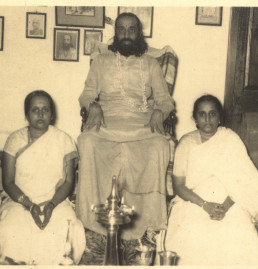
Kochu Narayani Amma
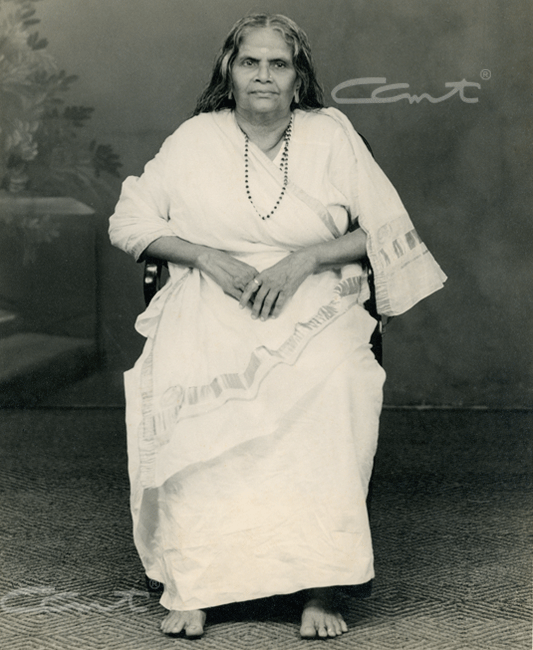
Kochu Narayani Amma
After the death of Parukutti Amma, Kochu Narayani Amma took on the entire responsibility of bringing up the young Balan. Swami Chinmayananda always referred to her as his mother.
Pujya Gurudev invited her to attend his jnana yajnas and made all arrangements for her to stay with close devotees like
Leela Nambiar Amma and Padmini Balachandran of Chennai. He gave his mother spiritual advice and intensified her sadhana with appropriate guidelines.
In the later years, when she had developed cataract, Pujya Gurudev arranged for her cataract surgery in Coimbatore and served her personally.
Kuttan Menon
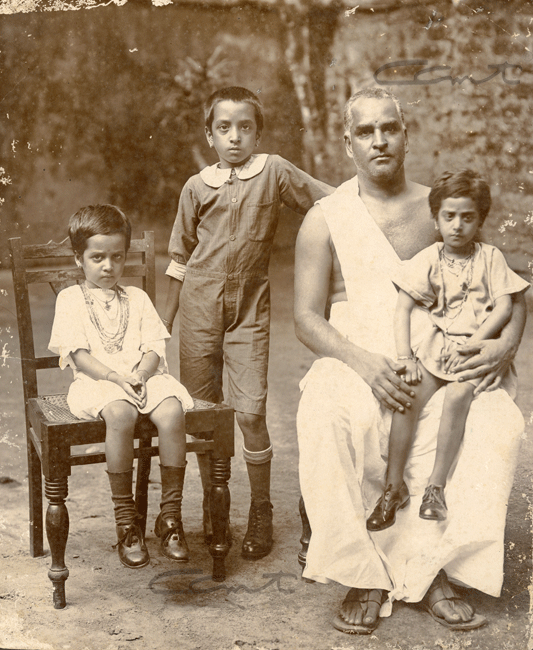
Kuttan Menon
Pujya Gurudev had a very good bonding with his father Kuttan Menon and seems to have inherited his passion for tennis and story-telling. Kuttan Menon would invite all his brothers’ children during their vacations and regale them with stories.
Kuttan Menon always wore a dhoti and uttariyam (upper cloth). In those days, in Kerala, it was beneath their dignity to wear stitched clothes. He was a Munseef and had the special privilege of playing tennis in his dhoti in the local tennis club.
Some seven years after Parukutty’s demise, Kuttan Menon married Devaki, an educated young woman with strong religious leanings. The three children, Balan, Padmini and Kanakam moved in with them. In course of time, Kuttan Menon and Devaki had three daughters and one son – Malathy, Unni, Vijayalakshmi and Vimala.
After giving sannyasa diksha to Swami Chinmayananda, Swami Sivananda sent him to give talks in Kerala. At this time Swami Chinmayananda visited his father for the first time as a sannyasi. Kuttan Menon attended some of the talks. He must have been proud and delighted at this transformation of his eldest son. On Swami Chinmayananda’s return, he wrote a letter to Swami Sivananda, which can be read here.
Parukutty Amma
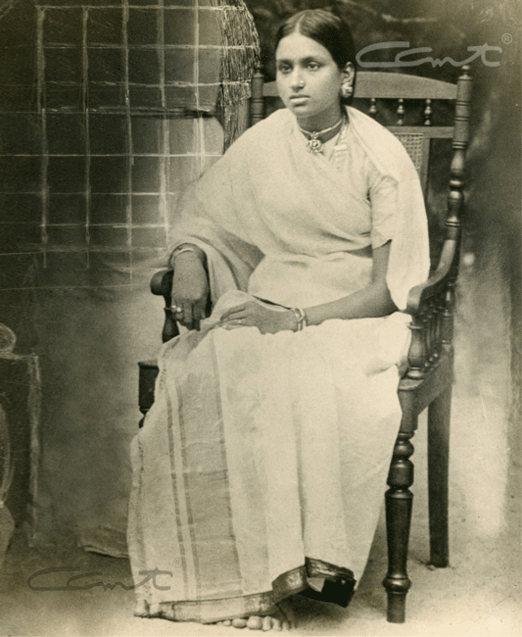
Parukutty Amma
Parukutty Amma gave birth to Balakrishna Menon on May 8, 1916. She was one of eight sisters and two brothers in Poothampalli House. Not much is known about her as a person, except that she was very gentle and highly spiritual, as was the rest of the family in Poothampalli House.
She would visit Ernakulathappan Siva Temple nearby almost every day, as did her other sisters. The entire family, including the children, gathered together for the evening prayers regularly in the puja room, where Vishnu Sahasranama was chanted. Later on, whenever Gurudev had a yajna in Ernakulam or nearby places, he would make it a point to visit the Ernakulathappan Temple. It is very significant that the Chinmaya Birth Centenary Celebrations were launched from the grounds of this temple in 2015.
Sadhu-Mahatmas visited Poothampalli House frequently. Among these were Sri Chattambi Swamigal and Yogiraj Bhairavananda Swamigal, who were the Kulagurus of the house. Pujya Gurudev narrates his earliest memories of Chattambi Swamigal and the special fragrance and feel of the Swami’s beard.
Parukutty Amma had two more children, both daughters, named Padmini and Kanakam. She took one look at her new-born child Kanakam and breathed her last because of the complications of child-birth. At that time Balakrishnan was barely five years old.
